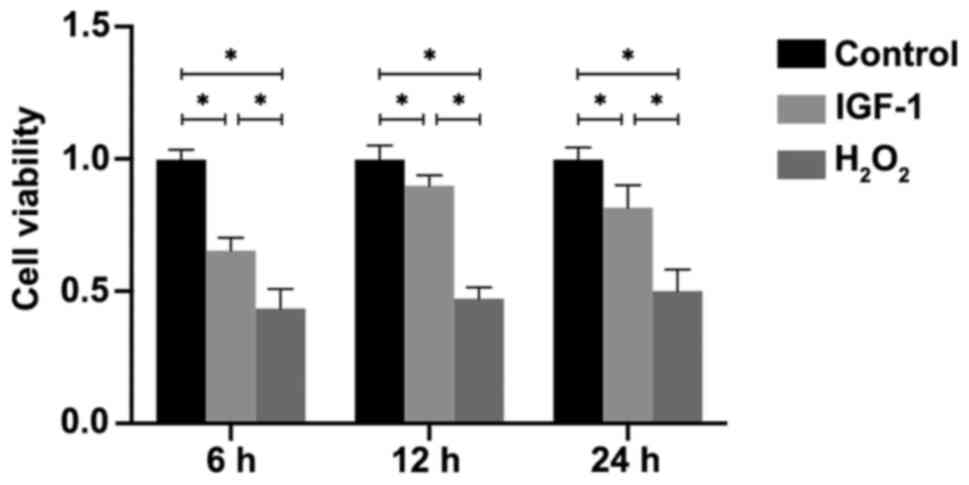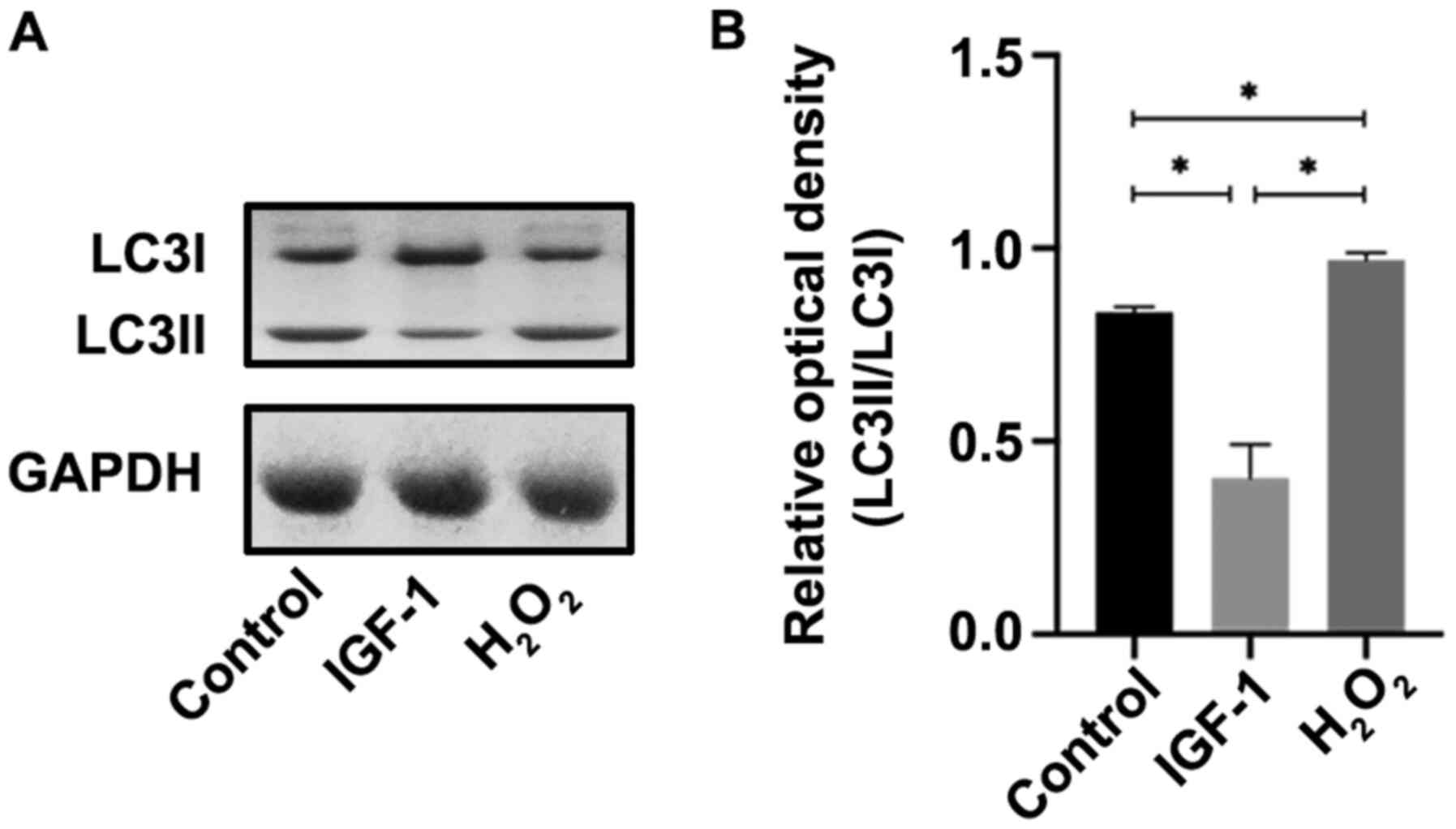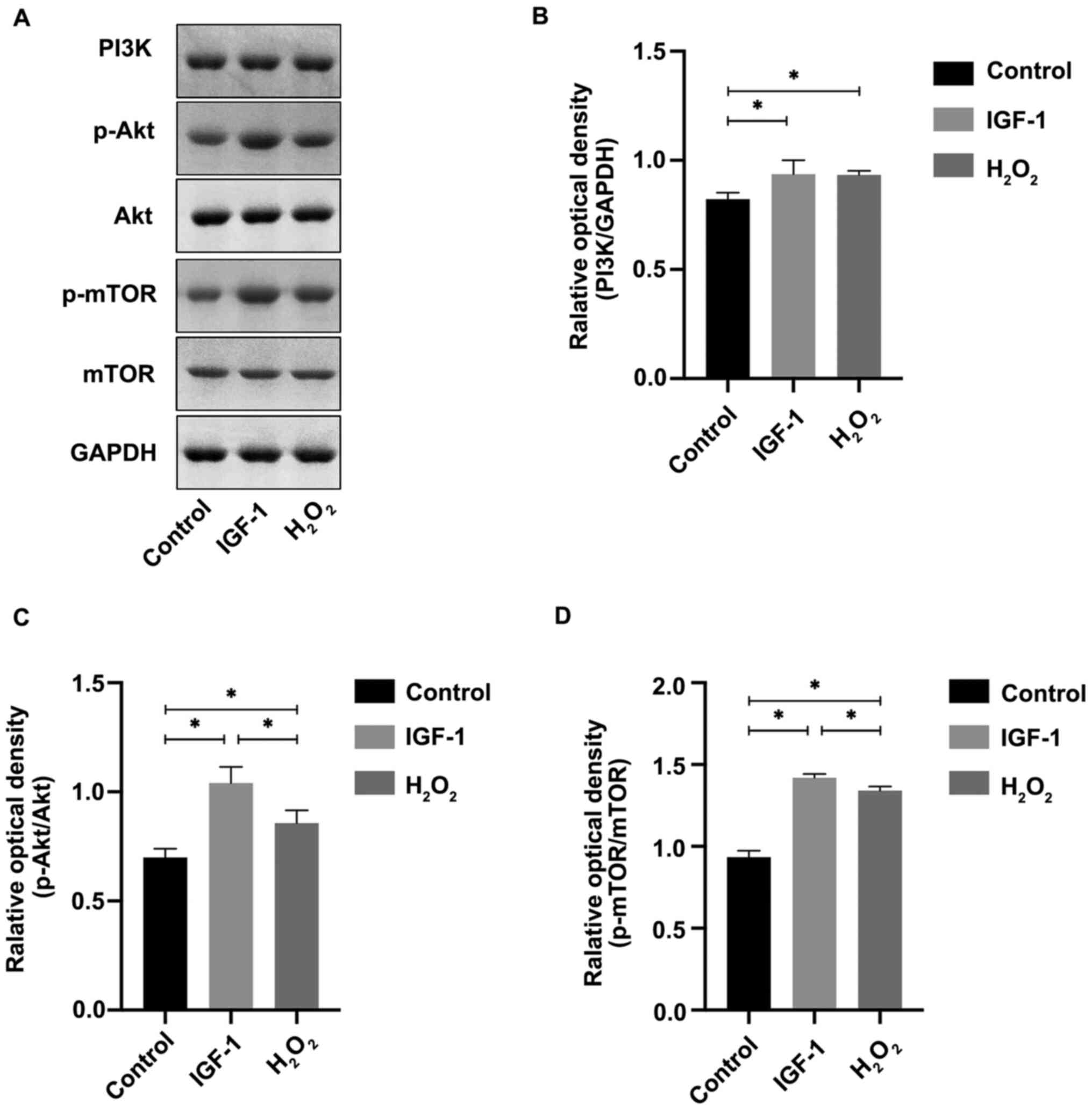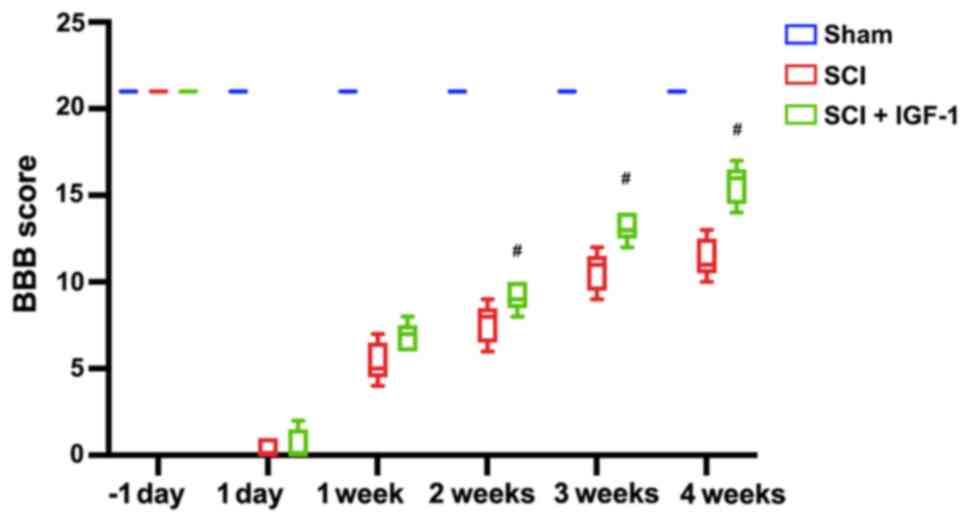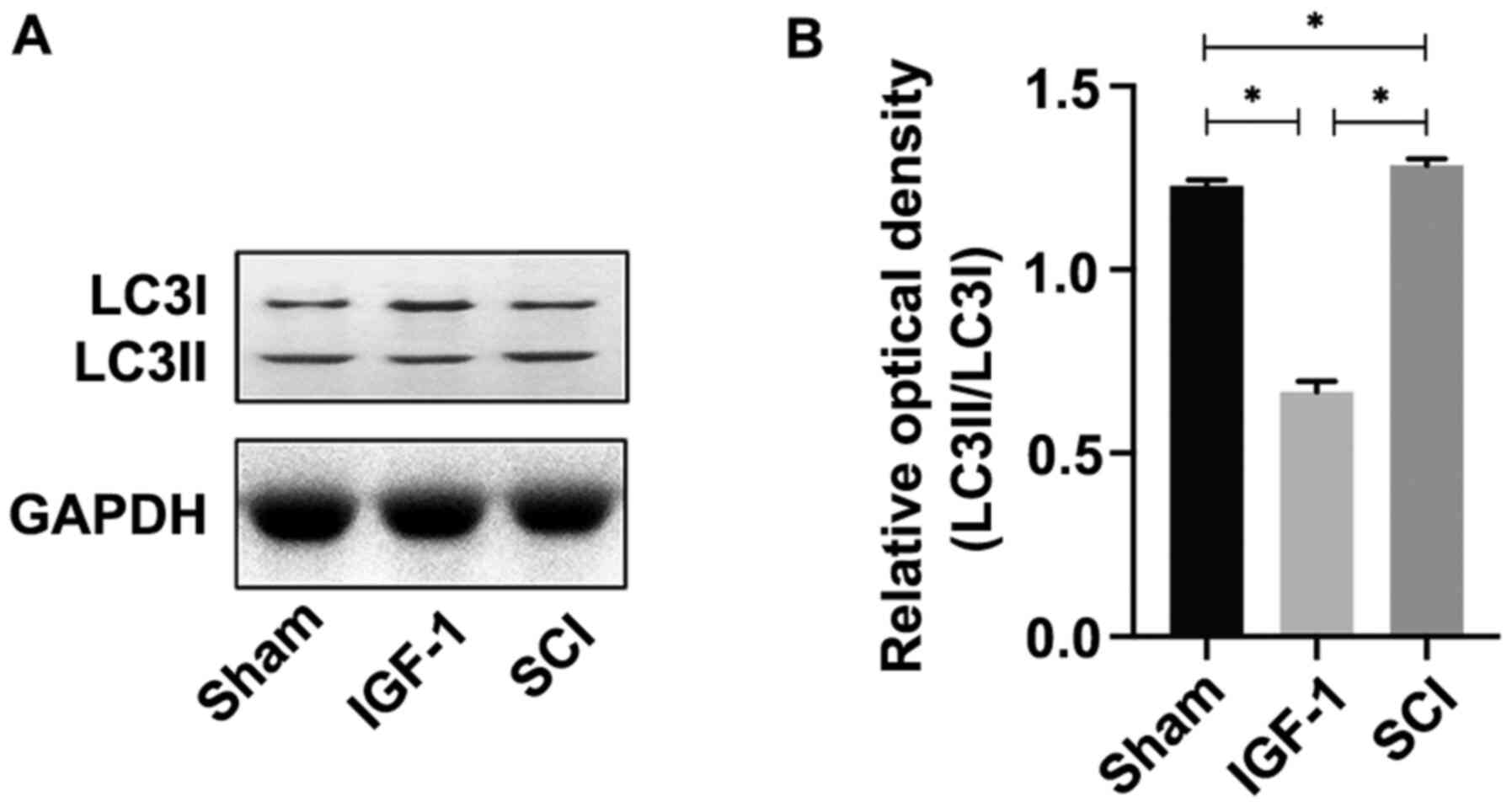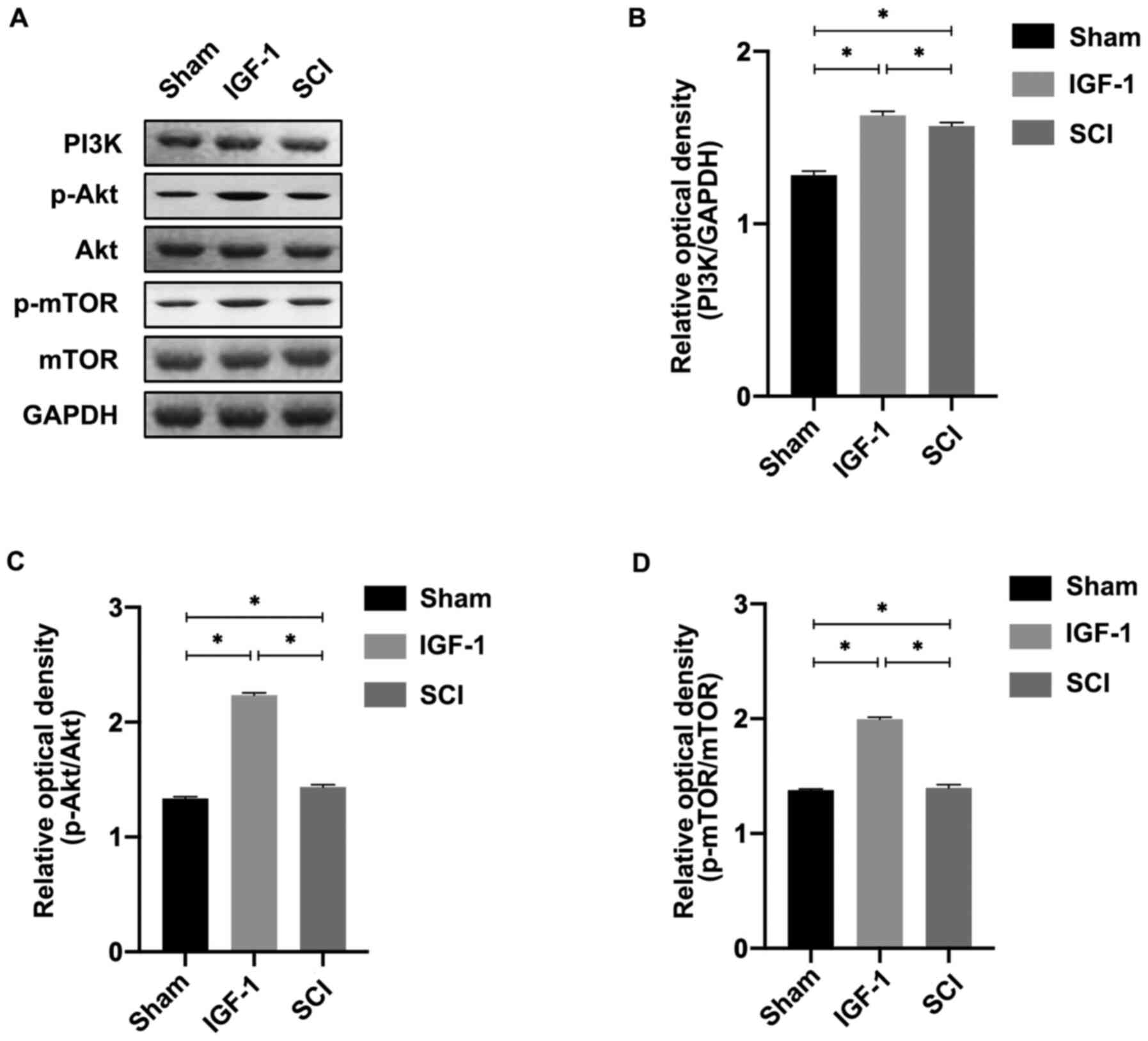|
1
|
Casili G, Campolo M, Lanza M, Filippone A,
Scuderi S, Messina S, Ardizzone A, Esposito E and Paterniti I: Role
of ABT888, a Novel Poly(ADP-Ribose) Polymerase (PARP) Inhibitor in
Countering Autophagy and Apoptotic Processes Associated to Spinal
Cord Injury. Mol Neurobiol. 57:4394–4407. 2020.PubMed/NCBI View Article : Google Scholar
|
|
2
|
Duncan GJ, Manesh SB, Hilton BJ, Assinck
P, Plemel JR and Tetzlaff W: The fate and function of
oligodendrocyte progenitor cells after traumatic spinal cord
injury. Glia. 68:227–245. 2020.PubMed/NCBI View Article : Google Scholar
|
|
3
|
Imai T, Katoh H, Suyama K, Kuroiwa M,
Yanagisawa S and Watanabe M: Amiloride promotes oligodendrocyte
survival and remyelination after spinal cord injury in rats. J Clin
Med. 7(7)2018.PubMed/NCBI View Article : Google Scholar
|
|
4
|
Zhou K, Sansur CA, Xu H and Jia X: The
Temporal Pattern, Flux, and Function of Autophagy in Spinal Cord
Injury. Int J Mol Sci. 18(466)2017.PubMed/NCBI View Article : Google Scholar
|
|
5
|
Silva NA, Sousa N, Reis RL and Salgado AJ:
From basics to clinical: A comprehensive review on spinal cord
injury. Prog Neurobiol. 114:25–57. 2014.PubMed/NCBI View Article : Google Scholar
|
|
6
|
Ham TR, Pukale DD, Hamrangsekachaee M and
Leipzig ND: Subcutaneous priming of protein-functionalized chitosan
scaffolds improves function following spinal cord injury. Mater Sci
Eng C Mater Biol Appl 110: 10.1016/j.msec.2020.110656, 2020.
|
|
7
|
Aleman A and Torres-Alemán I: Circulating
insulin-like growth factor I and cognitive function:
Neuromodulation throughout the lifespan. Prog Neurobiol.
89:256–265. 2009.PubMed/NCBI View Article : Google Scholar
|
|
8
|
Russo VC, Gluckman PD, Feldman EL and
Werther GA: The insulin-like growth factor system and its
pleiotropic functions in brain. Endocr Rev. 26:916–943.
2005.PubMed/NCBI View Article : Google Scholar
|
|
9
|
Liu W, D'Ercole JA and Ye P: Blunting type
1 insulin-like growth factor receptor expression exacerbates
neuronal apoptosis following hypoxic/ischemic injury. BMC Neurosci.
12(64)2011.PubMed/NCBI View Article : Google Scholar
|
|
10
|
O'Donnell SL, Frederick TJ, Krady JK,
Vannucci SJ and Wood TL: IGF-I and microglia/macrophage
proliferation in the ischemic mouse brain. Glia. 39:85–97.
2002.PubMed/NCBI View Article : Google Scholar
|
|
11
|
Huang TS, Wang YH and Lien IN: Suppression
of the hypothalamus-pituitary somatotrope axis in men with spinal
cord injuries. Metabolism. 44:1116–1120. 1995.PubMed/NCBI View Article : Google Scholar
|
|
12
|
Petrova V and Eva R: The virtuous cycle of
axon growth: Axonal transport of growth-promoting machinery as an
intrinsic determinant of axon regeneration. Dev Neurobiol.
78:898–925. 2018.PubMed/NCBI View Article : Google Scholar
|
|
13
|
Bauman WA, Kirshblum SC, Morrison NG,
Cirnigliaro CM, Zhang RL and Spungen AM: Effect of low-dose
baclofen administration on plasma insulin-like growth factor-I in
persons with spinal cord injury. J Clin Pharmacol. 46:476–482.
2006.PubMed/NCBI View Article : Google Scholar
|
|
14
|
Moghaddam A, Sperl A, Heller R, Kunzmann
K, Graeser V, Akbar M, Gerner HJ and Biglari B: Elevated serum
insulin-like growth factor 1 levels in patients with neurological
remission after traumatic spinal cord injury. PLoS One.
11(e0159764)2016.PubMed/NCBI View Article : Google Scholar
|
|
15
|
Liu Y, Wang X, Li W, Zhang Q, Li Y, Zhang
Z, Zhu J, Chen B, Williams PR, Zhang Y, et al: A sensitized IGF1
treatment restores corticospinal axon-dependent functions. Neuron.
95:817–833.e4. 2017.PubMed/NCBI View Article : Google Scholar
|
|
16
|
Fu C-F, Liu Y, Li X, Shen B, Zhang S-K,
Song Z-M and Zhang X: Inhibitory effect of IGF-1 gene on
motoneurons apoptosis in anterior horn after acute spinal cord
injury in adult rats. 32nd edition. J Jilin Univeristy (Medicine).
4:568–570. 2006.(In Chinese).
|
|
17
|
Mizushima N: Autophagy: Process and
function. Genes Dev. 21:2861–2873. 2007.PubMed/NCBI View Article : Google Scholar
|
|
18
|
Mizushima N and Komatsu M: Autophagy:
Renovation of cells and tissues. Cell. 147:728–741. 2011.PubMed/NCBI View Article : Google Scholar
|
|
19
|
Rao S, Tortola L, Perlot T, Wirnsberger G,
Novatchkova M, Nitsch R, Sykacek P, Frank L, Schramek D, Komnenovic
V, et al: A dual role for autophagy in a murine model of lung
cancer. Nat Commun. 5(3056)2014.PubMed/NCBI View Article : Google Scholar
|
|
20
|
Zhang D, Zhu D, Wang F, Zhu JC, Zhai X,
Yuan Y and Li CX: Therapeutic effect of regulating autophagy in
spinal cord injury: A network meta-analysis of direct and indirect
comparisons. Neural Regen Res. 15:1120–1132. 2020.PubMed/NCBI View Article : Google Scholar
|
|
21
|
Liu S, Sarkar C, Dinizo M, Faden AI, Koh
EY, Lipinski MM and Wu J: Disrupted autophagy after spinal cord
injury is associated with ER stress and neuronal cell death. Cell
Death Dis. 6(e1582)2015.PubMed/NCBI View Article : Google Scholar
|
|
22
|
Silva R, Mesquita AR, Bessa J, Sousa JC,
Sotiropoulos I, Leão P, Almeida OF and Sousa N: Lithium blocks
stress-induced changes in depressive-like behavior and hippocampal
cell fate: The role of glycogen-synthase-kinase-3beta.
Neuroscience. 152:656–669. 2008.PubMed/NCBI View Article : Google Scholar
|
|
23
|
Periyasamy-Thandavan S, Jiang M,
Schoenlein P and Dong Z: Autophagy: Molecular machinery,
regulation, and implications for renal pathophysiology. Am J
Physiol Renal Physiol. 297:F244–F256. 2009.PubMed/NCBI View Article : Google Scholar
|
|
24
|
Zhang W, Liu Y, Wu M, Zhu X, Wang T, He K,
Li P and Wu X: PI3K inhibition protects mice from NAFLD by
down-regulating CMKLR1 and NLRP3 in Kupffer cells. J Physiol
Biochem. 73:583–594. 2017.PubMed/NCBI View Article : Google Scholar
|
|
25
|
Kazanis I, Giannakopoulou M, Philippidis H
and Stylianopoulou F: Alterations in IGF-I, BDNF and NT-3 levels
following experimental brain trauma and the effect of IGF-I
administration. Exp Neurol. 186:221–234. 2004.PubMed/NCBI View Article : Google Scholar
|
|
26
|
Zhu M, Li B, Ma X, Huang C, Wu R, Zhu W,
Li X, Liang Z, Deng F, Zhu J, et al: Folic acid protected neural
cells against aluminum-maltolate-induced apoptosis by preventing
miR-19 downregulation. Neurochem Res. 41:2110–2118. 2016.PubMed/NCBI View Article : Google Scholar
|
|
27
|
Park KW, Lin C-Y, Benveniste EN and Lee
Y-S: Mitochondrial STAT3 is negatively regulated by SOCS3 and
upregulated after spinal cord injury. Exp Neurol. 284 (Pt
A):98–105. 2016.PubMed/NCBI View Article : Google Scholar
|
|
28
|
Zhang D, Zhai X, Wang F, Li XH and He XJ:
Study of the neural protective effect of lithium on enhancement of
autophagy in vitro. Zhongguo Gu Shang. 32:952–956. 2019.PubMed/NCBI View Article : Google Scholar : (In Chinese).
|
|
29
|
Zhaohui C and Shuihua W: Protective
effects of SIRT6 against inflammation, oxidative stress, and cell
apoptosis in spinal cord injury. Inflammation. 43:1751–1758.
2020.PubMed/NCBI View Article : Google Scholar
|
|
30
|
Wang Y, Wang W, Li D, Li M, Wang P, Wen J,
Liang M, Su B and Yin Y: IGF-1 alleviates NMDA-induced
excitotoxicity in cultured hippocampal neurons against autophagy
via the NR2B/PI3K-AKT-mTOR pathway. J Cell Physiol. 229:1618–1629.
2014.PubMed/NCBI View Article : Google Scholar
|
|
31
|
Huang D, Shen S, Cai M, Jin L, Lu J, Xu K,
Zhang J, Feng G, Hu Y, Zheng K, et al: Role of mTOR complex in
IGF-1 induced neural differentiation of DPSCs. J Mol Histol.
50:273–283. 2019.PubMed/NCBI View Article : Google Scholar
|
|
32
|
Ministry of Science and Technology of the
People's Republic of China: Guidance to Ethical Treatment of
Animals for Experiments. http://www.most.gov.cn/xxgk/xinxifenlei/fdzdgknr/fgzc/gfxwj/gfxwj2010before/201712/t20171222_137025.html.
Accessed August 19, 2021 (In Chinese).
|
|
33
|
Zhang D, Li XH, Zhai X and He XJ:
Feasibility of 3.0 T diffusion-weighted nuclear magnetic resonance
imaging in the evaluation of functional recovery of rats with
complete spinal cord injury. Neural Regen Res. 10:412–418.
2015.PubMed/NCBI View Article : Google Scholar
|
|
34
|
Zhang D, Wang F, Zhai X, Li XH and He XJ:
Lithium promotes recovery of neurological function after spinal
cord injury by inducing autophagy. Neural Regen Res. 13:2191–2199.
2018.PubMed/NCBI View Article : Google Scholar
|
|
35
|
Barros AGC, Cristante AF, Santos GBD,
Natalino RJM, Ferreira RJR and Barros-Filho TEP: Evaluation of the
effects of erythropoietin and interleukin-6 in rats submitted to
acute spinal cord injury. Clinics (São Paulo).
74(e674)2019.PubMed/NCBI View Article : Google Scholar
|
|
36
|
Zhou L, Fan MD, Jiang J and Xue W: Effect
of IGF-1 on cognitive function and apoptosis of hippocampal tissue
neurons in rats with delayed neuropsychologic sequelae after carbon
monoxide poisoning. J Brain Nerv Dis. 27:661–666. 2019.
|
|
37
|
Wang S and Gu K: Insulin-like growth
factor 1 inhibits autophagy of human colorectal carcinoma
drug-resistant cells via the protein kinase B/mammalian target of
rapamycin signaling pathway. Mol Med Rep. 17:2952–2956.
2018.PubMed/NCBI View Article : Google Scholar
|
|
38
|
Basso DM, Beattie MS and Bresnahan JC: A
sensitive and reliable locomotor rating scale for open field
testing in rats. J Neurotrauma. 12:1–21. 1995.PubMed/NCBI View Article : Google Scholar
|
|
39
|
Turtle JD, Henwood MK, Strain MM, Huang
YJ, Miranda RC and Grau JW: Engaging pain fibers after a spinal
cord injury fosters hemorrhage and expands the area of secondary
injury. Exp Neurol. 311:115–124. 2019.PubMed/NCBI View Article : Google Scholar
|
|
40
|
Frysak Z, Schovanek J, Iacobone M and
Karasek D: Insulin-like Growth Factors in a clinical setting:
Review of IGF-I. Biomed Pap Med Fac Univ Palacky Olomouc Czech
Repub. 159:347–351. 2015.PubMed/NCBI View Article : Google Scholar
|
|
41
|
de la Monte SM, Tong M, Cohen AC, Sheedy
D, Harper C and Wands JR: Insulin and insulin-like growth factor
resistance in alcoholic neurodegeneration. Alcohol Clin Exp Res.
32:1630–1644. 2008.PubMed/NCBI View Article : Google Scholar
|
|
42
|
Madathil SK, Carlson SW, Brelsfoard JM, Ye
P, D'Ercole AJ and Saatman KE: Astrocyte-specific overexpression of
insulin-like growth factor-1 protects hippocampal neurons and
reduces behavioral deficits following traumatic brain injury in
mice. PLoS One. 8(e67204)2013.PubMed/NCBI View Article : Google Scholar
|
|
43
|
Ferbert T, Child C, Graeser V, Swing T,
Akbar M, Heller R, Biglari B and Moghaddam A: Tracking spinal cord
injury: Differences in cytokine expression of IGF-1, TGF-B1, and
sCD95I can be measured in blood samples and correspond to
neurological remission in a 12-week follow-up. J Neurotrauma.
34:607–614. 2017.PubMed/NCBI View Article : Google Scholar
|
|
44
|
Muresanu DF, Sharma A, Lafuente JV,
Patnaik R, Tian ZR, Nyberg F and Sharma HS: Nanowired delivery of
growth hormone attenuates pathophysiology of spinal cord injury and
enhances insulin-like growth factor-1 concentration in the plasma
and the spinal cord. Mol Neurobiol. 52:837–845. 2015.PubMed/NCBI View Article : Google Scholar
|
|
45
|
Galluzzi L, Morselli E, Vicencio JM, Kepp
O, Joza N, Tajeddine N and Kroemer G: Life, death and burial:
Multifaceted impact of autophagy. Biochem Soc Trans. 36:786–790.
2008.PubMed/NCBI View Article : Google Scholar
|
|
46
|
Hayashi-Nishino M, Fujita N, Noda T,
Yamaguchi A, Yoshimori T and Yamamoto A: A subdomain of the
endoplasmic reticulum forms a cradle for autophagosome formation.
Nat Cell Biol. 11:1433–1437. 2009.PubMed/NCBI View Article : Google Scholar
|
|
47
|
Kourtis N and Tavernarakis N: Autophagy
and cell death in model organisms. Cell Death Differ. 16:21–30.
2009.PubMed/NCBI View Article : Google Scholar
|
|
48
|
Kroemer G and Levine B: Autophagic cell
death: The story of a misnomer. Nat Rev Mol Cell Biol. 9:1004–1010.
2008.PubMed/NCBI View Article : Google Scholar
|
|
49
|
Levine B and Yuan J: Autophagy in cell
death: An innocent convict? J Clin Invest. 115:2679–2688.
2005.PubMed/NCBI View Article : Google Scholar
|
|
50
|
Wu YT, Tan HL, Huang Q, Ong CN and Shen
HM: Activation of the PI3K-Akt-mTOR signaling pathway promotes
necrotic cell death via suppression of autophagy. Autophagy.
5:824–834. 2009.PubMed/NCBI View Article : Google Scholar
|
|
51
|
Klionsky DJ, Abdelmohsen K, Abe A, Abedin
MJ, Abeliovich H, Acevedo Arozena A, Adachi H, Adams CM, Adams PD,
Adeli K, et al: Guidelines for the use and interpretation of assays
for monitoring autophagy (3rd edition). Authophagy. 12:1–222.
2016.PubMed/NCBI View Article : Google Scholar
|
|
52
|
Wang H, Wu Y, Han W, Li J, Xu K, Li Z,
Wang Q, Xu K, Liu Y, Xie L, et al: Hydrogen Sulfide Ameliorates
Blood-Spinal Cord Barrier Disruption and Improves Functional
Recovery by Inhibiting Endoplasmic Reticulum Stress-Dependent
Autophagy. Front Pharmacol. 9(858)2018.PubMed/NCBI View Article : Google Scholar
|
|
53
|
Wu J and Lipinski MM: Autophagy in
neurotrauma: Good, bad, or dysregulated. Cells. 8(8)2019.PubMed/NCBI View Article : Google Scholar
|
|
54
|
Bai L, Mei X, Shen Z, Bi Y, Yuan Y, Guo Z,
Wang H, Zhao H, Zhou Z, Wang C, et al: Netrin-1 improves functional
recovery through autophagy regulation by activating the AMPK/mTOR
signaling pathway in rats with spinal cord injury. Sci Rep.
7(42288)2017.PubMed/NCBI View Article : Google Scholar
|
|
55
|
Li J, Wang Q, Cai H, He Z, Wang H, Chen J,
Zheng Z, Yin J, Liao Z, Xu H, et al: FGF1 improves functional
recovery through inducing PRDX1 to regulate autophagy and anti-ROS
after spinal cord injury. J Cell Mol Med. 22:2727–2738.
2018.PubMed/NCBI View Article : Google Scholar
|
|
56
|
Li Z, Liu F, Zhang L, Cao Y, Shao Y, Wang
X, Jiang X and Chen Z: Neuroserpin restores autophagy and promotes
functional recovery after acute spinal cord injury in rats. Mol Med
Rep. 17:2957–2963. 2018.PubMed/NCBI View Article : Google Scholar
|
|
57
|
Wang P, Lin C, Wu S, Huang K, Wang Y, Bao
X, Zhang F, Huang Z and Teng H: Inhibition of autophagy is involved
in the protective effects of ginsenoside Rb1 on spinal cord injury.
Cell Mol Neurobiol. 38:679–690. 2018.PubMed/NCBI View Article : Google Scholar
|
|
58
|
Bianchi VE, Locatelli V and Rizzi L:
Neurotrophic and neuroregenerative effects of GH/IGF1. Int J Mol
Sci. 18(18)2017.PubMed/NCBI View Article : Google Scholar
|
|
59
|
Marín-Aguilar F, Castejón-Vega B,
Alcocer-Gómez E, Lendines-Cordero D, Cooper MA, de la Cruz P,
Andújar-Pulido E, Pérez-Alegre M, Muntané J, Pérez-Pulido AJ, et
al: NLRP3 Inflammasome Inhibition by MCC950 in Aged Mice Improves
Health via Enhanced Autophagy and PPARα Activity. J Gerontol A Biol
Sci Med Sci. 75:1457–1464. 2020.PubMed/NCBI View Article : Google Scholar
|
|
60
|
Marín-Aguilar F, Lechuga-Vieco AV,
Alcocer-Gómez E, Castejón-Vega B, Lucas J, Garrido C,
Peralta-Garcia A, Pérez-Pulido AJ, Varela-López A, Quiles JL, et
al: NLRP3 inflammasome suppression improves longevity and prevents
cardiac aging in male mice. Aging Cell. 19(e13050)2020.PubMed/NCBI View Article : Google Scholar
|
|
61
|
Zhang HY, Wang ZG, Wu FZ, Kong XX, Yang J,
Lin BB, Zhu SP, Lin L, Gan CS, Fu XB, et al: Regulation of
autophagy and ubiquitinated protein accumulation by bFGF promotes
functional recovery and neural protection in a rat model of spinal
cord injury. Mol Neurobiol. 48:452–464. 2013.PubMed/NCBI View Article : Google Scholar
|
|
62
|
Renna M, Bento CF, Fleming A, Menzies FM,
Siddiqi FH, Ravikumar B, Puri C, Garcia-Arencibia M, Sadiq O,
Corrochano S, et al: IGF-1 receptor antagonism inhibits autophagy.
Hum Mol Genet. 22:4528–4544. 2013.PubMed/NCBI View Article : Google Scholar
|
|
63
|
Jean S and Kiger AA: Classes of
phosphoinositide 3-kinases at a glance. J Cell Sci. 127:923–928.
2014.PubMed/NCBI View Article : Google Scholar
|
|
64
|
Gulluni F, De Santis MC, Margaria JP,
Martini M and Hirsch E: Class II PI3K functions in cell biology and
disease. Trends Cell Biol. 29:339–359. 2019.PubMed/NCBI View Article : Google Scholar
|
|
65
|
Alliouachene S, Bilanges B, Chicanne G,
Anderson KE, Pearce W, Ali K, Valet C, Posor Y, Low PC, Chaussade
C, et al: Inactivation of the class II PI3K-C2β potentiates insulin
signaling and sensitivity. Cell Rep. 13:1881–1894. 2015.PubMed/NCBI View Article : Google Scholar
|
|
66
|
Valet C, Chicanne G, Severac C, Chaussade
C, Whitehead MA, Cabou C, Gratacap MP, Gaits-Iacovoni F,
Vanhaesebroeck B, Payrastre B, et al: Essential role of class II
PI3K-C2α in platelet membrane morphology. Blood. 126:1128–1137.
2015.PubMed/NCBI View Article : Google Scholar
|
|
67
|
Yu X, Long YC and Shen HM: Differential
regulatory functions of three classes of phosphatidylinositol and
phosphoinositide 3-kinases in autophagy. Autophagy. 11:1711–1728.
2015.PubMed/NCBI View Article : Google Scholar
|
|
68
|
Vanhaesebroeck B, Guillermet-Guibert J,
Graupera M and Bilanges B: The emerging mechanisms of
isoform-specific PI3K signalling. Nat Rev Mol Cell Biol.
11:329–341. 2010.PubMed/NCBI View Article : Google Scholar
|
|
69
|
Okada S, Hara M, Kobayakawa K, Matsumoto Y
and Nakashima Y: Astrocyte reactivity and astrogliosis after spinal
cord injury. Neurosci Res. 126:39–43. 2018.PubMed/NCBI View Article : Google Scholar
|
|
70
|
Chen CH, Sung CS, Huang SY, Feng CW, Hung
HC, Yang SN, Chen NF, Tai MH, Wen ZH and Chen WF: The role of the
PI3K/Akt/mTOR pathway in glial scar formation following spinal cord
injury. Exp Neurol. 278:27–41. 2016.PubMed/NCBI View Article : Google Scholar
|
|
71
|
Hou H, Zhang L, Zhang L and Tang P: Acute
spinal cord injury in rats should target activated autophagy. J
Neurosurg Spine. 20:568–577. 2014.PubMed/NCBI View Article : Google Scholar
|
|
72
|
Goldshmit Y, Kanner S, Zacs M, Frisca F,
Pinto AR, Currie PD and Pinkas-Kramarski R: Rapamycin increases
neuronal survival, reduces inflammation and astrocyte proliferation
after spinal cord injury. Mol Cell Neurosci. 68:82–91.
2015.PubMed/NCBI View Article : Google Scholar
|
|
73
|
Latacz A, Russell JA, Ocłon E, Zubel-łojek
J and Pierzchała-Koziec K: mTOR pathway - novel modulator of
astrocyte activity. Folia Biol (Krakow). 63:95–105. 2015.PubMed/NCBI View Article : Google Scholar
|
|
74
|
Muñoz-Galdeano T, Reigada D, Del Águila Á,
Velez I, Caballero-López MJ, Maza RM and Nieto-Díaz M: Cell
specific changes of autophagy in a mouse model of contusive spinal
cord injury. Front Cell Neurosci. 12(164)2018.PubMed/NCBI View Article : Google Scholar
|
|
75
|
Sarkar C, Zhao Z, Aungst S, Sabirzhanov B,
Faden AI and Lipinski MM: Impaired autophagy flux is associated
with neuronal cell death after traumatic brain injury. Autophagy.
10:2208–2222. 2014.PubMed/NCBI View Article : Google Scholar
|
|
76
|
Fang B, Li XQ, Bao NR, Tan WF, Chen FS, Pi
XL, Zhang Y and Ma H: Role of autophagy in the bimodal stage after
spinal cord ischemia reperfusion injury in rats. Neuroscience.
328:107–116. 2016.PubMed/NCBI View Article : Google Scholar
|
|
77
|
Woelfle J, Chia DJ, Massart-Schlesinger
MB, Moyano P and Rotwein P: Molecular physiology, pathology, and
regulation of the growth hormone/insulin-like growth factor-I
system. Pediatr Nephrol. 20:295–302. 2005.PubMed/NCBI View Article : Google Scholar
|
|
78
|
Ranke MB, Wölfle J, Schnabel D and
Bettendorf M: Treatment of dwarfism with recombinant human
insulin-like growth factor-1. Dtsch Arztebl Int. 106:703–709.
2009.PubMed/NCBI View Article : Google Scholar
|
|
79
|
Mukhamedshina YO, Gilazieva ZE, Arkhipova
SS, Galieva LR, Garanina EE, Shulman AA, Yafarova GG, Chelyshev YA,
Shamsutdinova NV and Rizvanov AA: Electrophysiological,
Morphological, and Ultrastructural Features of the Injured Spinal
Cord Tissue after Transplantation of Human Umbilical Cord Blood
Mononuclear Cells Genetically Modified with the VEGF and GDNF
Genes. Neural Plasticity. 2017(9857918)2017.PubMed/NCBI View Article : Google Scholar
|















